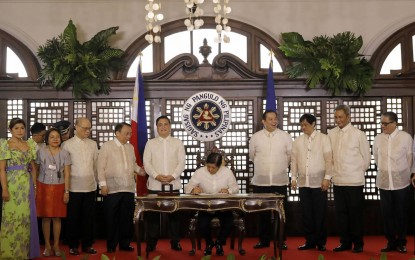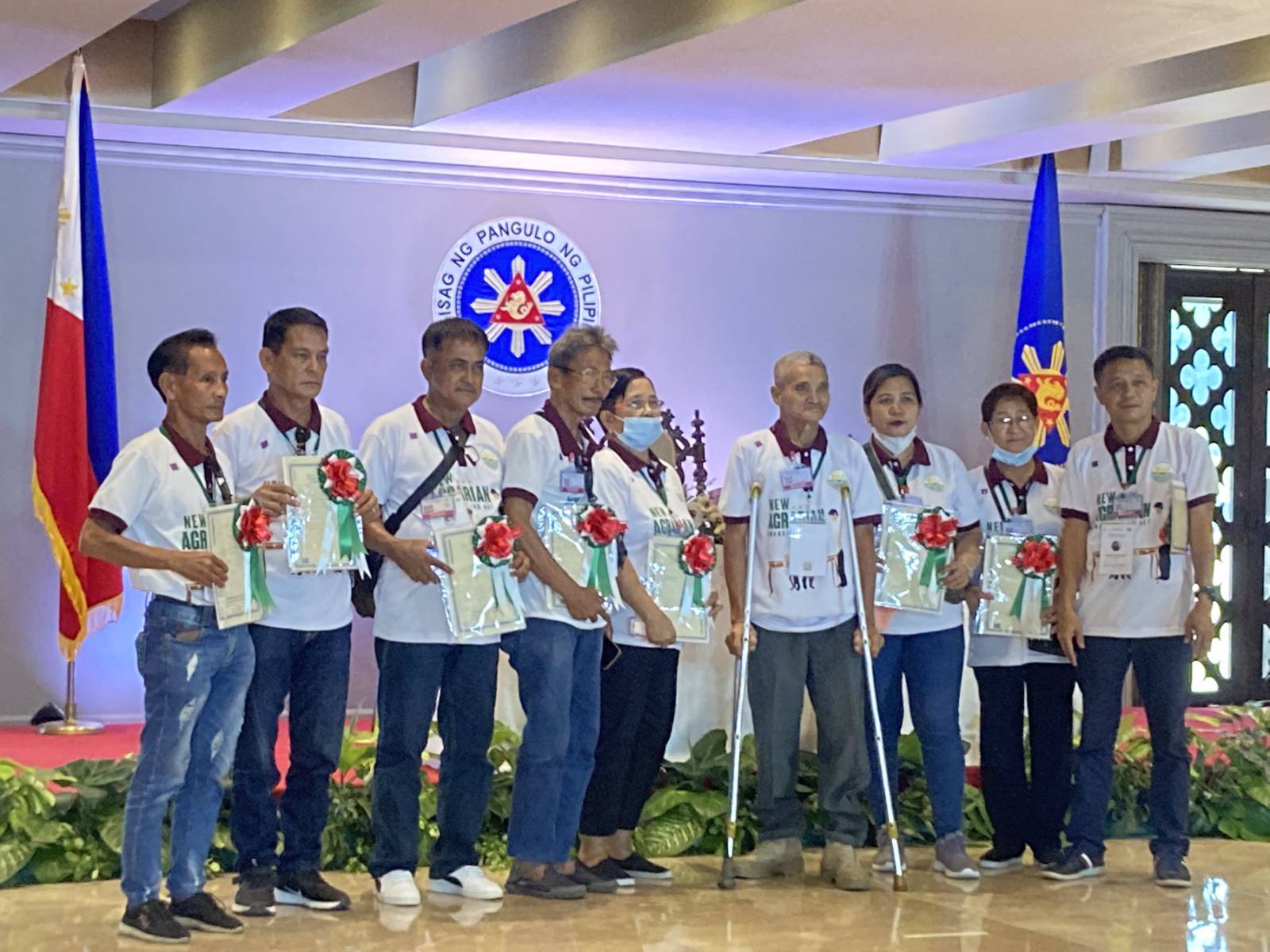
DEBT-FREE FARMERS. President Ferdinand R. Marcos Jr. signs the New Agrarian Emancipation Act during a ceremony in Malacañan Palace in Manila on Friday (July 7, 2023). The new law condones all loans, including interests, penalties, and surcharges incurred by agrarian reform beneficiaries from land awarded to them. (PNA photo by Rey Baniquet)
MANILA – President Ferdinand R. Marcos Jr. on Friday signed into law the Malacañang-sponsored New Agrarian Emancipation Bill that aims to make the farmer-beneficiaries of the government’s agrarian reform program debt-free.
Marcos signed Republic Act (RA) 11953 in a ceremony held at the Kalayaan Hall of Malacañan Palace in Manila.
"Pinangako ko sa ating mga kababayan na itutuloy ang (I promised our countrymen that we will continue the) Agrarian Reform Program. I'm here today to build on that promise because our beneficiaries deserve nothing less. Ituloy natin ang repormang agraryo (Let us continue the agrarian reform)," he said in a keynote speech.
The New Agrarian Emancipation Act condones all loans, including interests, penalties, and surcharges incurred by agrarian reform beneficiaries (ARBs) from land awarded to them under Presidential Decree (PD) 27, RA 6657, and RA 9700.
PD 27 is the Tenant Emancipation Decree of the late president Ferdinand Marcos Sr. issued on Oct. 21, 1972.
RA 6657 is the Comprehensive Agrarian Reform Law of 1988, while RA 9700 is the legislation extending the acquisition and distribution of agricultural lands under the Comprehensive Agrarian Reform Program (CARP).
Under the existing agrarian laws, ARBs are required to pay for the lands awarded to them in annual amortization for a maximum of 30 years.
Marcos also emphasized that genuine agrarian emancipation requires more than just the distribution of land, saying the provision of credit facilities and support services for farmers must be broadened.
“These efforts will yield more sustainable farms and higher incomes for our farmers. As your president I assure you we will never stop providing our farmers with the support that they need to make their farms more productive while also improving the lives and their lives and that of their families,” he said.
Marcos pledged to address the farmers’ concerns by enhancing the efficiency of agrarian case resolution systems for faster outcomes.
He reiterated his commitment to revitalizing the agricultural industry to attract and train new generations of young farmers “who will become the driving force behind modernized and profitable agriculture sector that fuels sustainable rural development.”
“It is time to give our farmers the recognition that they deserve as the providers of our nation’s sustenance, the providers of life to all of Filipinos,” Marcos said.
“Let us work together to realize this dream, our dream, as it was my father’s dream to give every Filipino farmer and his or her family, a life beyond mere survival, a life free from hunger or fear of the future.”

RA 11953 law covers the PHP57.56 billion in agrarian arrears, benefiting 610,054 ARBs who are tilling a total of 1,173,101.57 hectares of awarded land.
Under the newly signed law, the ARBs will also be included in the Registry System for Basic Sectors in Agriculture of the Department of Agriculture (DA) currently chaired by Marcos.
Their inclusion entitles them to all support services given to farmers by the DA and other government agencies.
Sixty days after the effectivity of RA 11953, the Department of Agrarian Reform (DAR), in coordination with the Executive Committee of the Presidential Agrarian Reform Council, will issue rules and regulations for the effective implementation of the new law.
The New Agrarian Emancipation Act is the fulfillment of Marcos’ call on Congress during his first State of the Nation Address in July 2022 to pass a law condoning the farmers’ unpaid debt.
Awarding of titles
Marcos also led the ceremonial awarding of titles to ARBs at Malacañan Palace’s Heroes Hall.
In a speech delivered at Malacañan Palace, DAR Secretary Conrado Estrella III said the agency simultaneously distributed a total of 32,441 land titles to about 27,132 ARBs nationwide covering 39,269 hectares.
"Now, Mr. President, we can say that in your first year as president of the Republic, you have done a lot for your country," Estrella told Marcos.
Continuing the process
In a succeeding press briefing, Marcos and Estrella expressed the belief that they did the right thing in continuing what their forefathers began.
Marcos said that this means continuing the process started by his father, former President Ferdinand E. Marcos Sr., and Estrella’s grandfather Conrado Estrella Sr., who also served as Minister of DAR.
“Ang kahulugan nito ay ipinagpapatuloy lamang natin ang nasimulan at sa aking palagay ay napakalaking hakbang nito, kaya ipinagmamalaki naming lahat ng tumulong dito (This means that we are continuing what was started and I think this is a major step, that is why we are all so proud of everyone who helped),” Marcos said. “Kahit hindi eksperto sa agrarian reform ay makikita na tama itong ginawa natin (Even those who are not experts in agrarian reform will see that we did the right thing).”
For his part, Estrella said that despite the many challenges that the DAR hurdled in pushing for the enactment of the law, the directives given them by Marcos made them determined to see it to the end.
“Maraming naging problema, pero nag utos ang mahal na pangulo, ‘bakit pa kokolektahin pa yang utang na yan, ibigay na lang natin ng libre yan tutal marami ng nangyari nung nakaraan, ang dami ng developments na nagpahirap sa mga magsasaka (There have been many problems., but the president gave his mandate, ‘why should we still collect those loans, let us just give them for free since there has been many past developments that made the life of our farmers difficult),” he said.
With the signing of RA 11953, Estrella said that what has been once termed as a “happy bill” has now become a “happy law.”(With a report from Marita Moaje/PNA)
